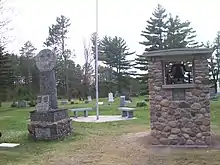

The funeral tolling of a bell is the technique of sounding a single bell very slowly, with a significant gap between strikes. It is used to mark the death of a person at a funeral or burial service.
The expression "tolling" is derived from the English tradition of "telling" of the death by signalling with a bell. The term tolling may also be used to signify a single bell being rung slowly, and possibly half-muffled at a commemoration event many years later.
Tolling is typically used for tenor bells in change ringing, it also applies to bourdon bells as well in a bell tower or cathedral.
Origins
Historically, a bell would be rung on three occasions around the time of a death. The first was the "passing bell" to warn of impending death, followed by the death knell which was the ringing of a bell immediately after the death, and the last was the "lych bell", or "corpse bell" which was rung at the funeral as the procession approached the church.[1] This latter is closest to what is known today as the Funeral toll.
Today, customs vary regarding when and for how long the bell tolls at a funeral.
In churches with full-circle English bells, for commemorative services such as funerals, memorial services and Remembrance Sunday, the bells are rung half-muffled instead with a leather pad on one side of the clapper in call changes or method ringing. Very rarely are they rung fully-muffled with pads both sides. This can often be a quarter peal or peal – the latter lasting three hours.
See also
Video
References
- ↑ Walters P 154–160
- Stahlschmidt J.C.L: The Church Bells of Kent: Their inscriptions, founders, uses and traditions, p. 126. Elliot Stock, 1887.
- H B Walters, The Church Bells of England. Published 1912 and republished 1977 by Oxford University Press.
- The Church Bells of Kent
- Bells and Mourning
- Funeral Order Of Service Painting